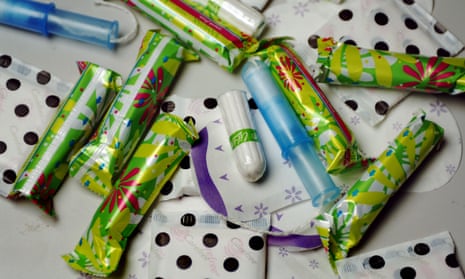This summer, periods hit the news. Olympian Fu Yuanhui blamed hers for a lacklustre performance at Rio, the tampon tax became an economic issue and the hashtag #RedSummer has brought witty period chat to Twitter. It turns out that women do have periods and we can talk about them. But the conversation hasn’t gone nearly far enough, and most of us are still politely silent about the logistics. I know plenty about my best friends’ contraception methods yet virtually nothing about how they deal with menstruation.
Anglian Water has been addressing this conspiracy of squeamishness with research about behaviour. It has found that nearly half of women flush tampons and consider this a normal method of disposal. In fact, an estimated 1.5bn to 2bn sanitary items are flushed down Britain’s toilets each year. But there’s a risk that flushed tampons, applicators or pads will accumulate and block your drains, which can flood homes and gardens. I have a traumatic memory from university of a plumber removing such debris from communal toilet pipes. It wasn’t pretty. On a national level, it costs £88m a year to unblock the sewers maintained by our water and sewerage companies – we pay for this in our water bills.
Sanitary products aren’t always effectively filtered out by the waste treatment plants and can end up in rivers and coastal waters. The Marine Conservation Society reports that sewage-related debris makes up about 6% of Britain’s beach litter – and most of us agree that tampons don’t make great swimming companions.
Interestingly, the “flush it out of sight” approach is not shared by women in many other European countries, where binning is normal. As a result, sanitary items are found in much lower numbers on continental beaches.
There’s been lots of coverage about the impending ban on microplastic beads in products such as face scrubs, but no explanation that pads, tampons or applicators in the marine environment don’t disintegrate like tissue paper. Over years they break down to become yet more microplastics in the ocean.
Take a look on the back of a box of tampons and it is obvious why women think it is OK to flush them. If disposal advice is given, it is probably the symbol of a small toilet with a cross through it on the base of the box, with no explanation. It is very unlikely to be noticed; after all, who is in the habit of turning tampon boxes upside down?
Manufacturers want to give the illusion of mess-free convenience when it comes to dealing with the blue fluid that women supposedly emit at our rollerblading time of the month. Meanwhile, many other organisations associated with waste disposal seem to struggle to give clear advice. Terms such as “bathroom items” are coyly used, and even the more explicit “sanitary products” can be misinterpreted to just mean pads. Even the “What not to flush” guide by Water UK, the organisation representing all major water and wastewater service providers, fails to spell it out.
Let’s not forget that inappropriate flushing isn’t just a female issue. Wet wipes, condoms and cotton buds are serial offenders too. In 2015, during the Marine Conservation Society’s Great British Beach Clean, volunteers found nearly 4,000 wet wipes around the UK coastline – that’s roughly 50 for every kilometre cleaned – a 30% rise on the previous year and a 400% rise in a decade.
Many wipes for “personal freshness” (aka wiping your bottom) are sold as flushable – but they are not. There simply wouldn’t be a market for them if we were advised to put soiled wipes in our bathroom bin, and the manufacturers know this.
We can do without wet wipes, but decent menstrual products are essential. In an ideal world, women would opt for eco-friendly alternatives. These include silicone cups, sea sponges and reusable cloth pads – all of which have a somewhat hippy reputation but offer the added bonus of eliminating waste to landfill. They are unlikely to become mainstream options any time soon.
Biodegradable, 100% cotton tampons are a greener choice than standard products – but they still can’t be flushed. Either way, it needs to be easier and less embarrassing for sanitary products to be binned. Biodegradable bags like FabLittleBag can help make the process more discreet. Critically, we need accurate labelling of products with disposal information that is easy to see, understand and care about.
This month, the British Retail Consortium will meet environmental charities to discuss sanitary items and wipes. I’m keeping my legs crossed for better product labelling and a shift in attitudes arising from some frank and productive conversations.
